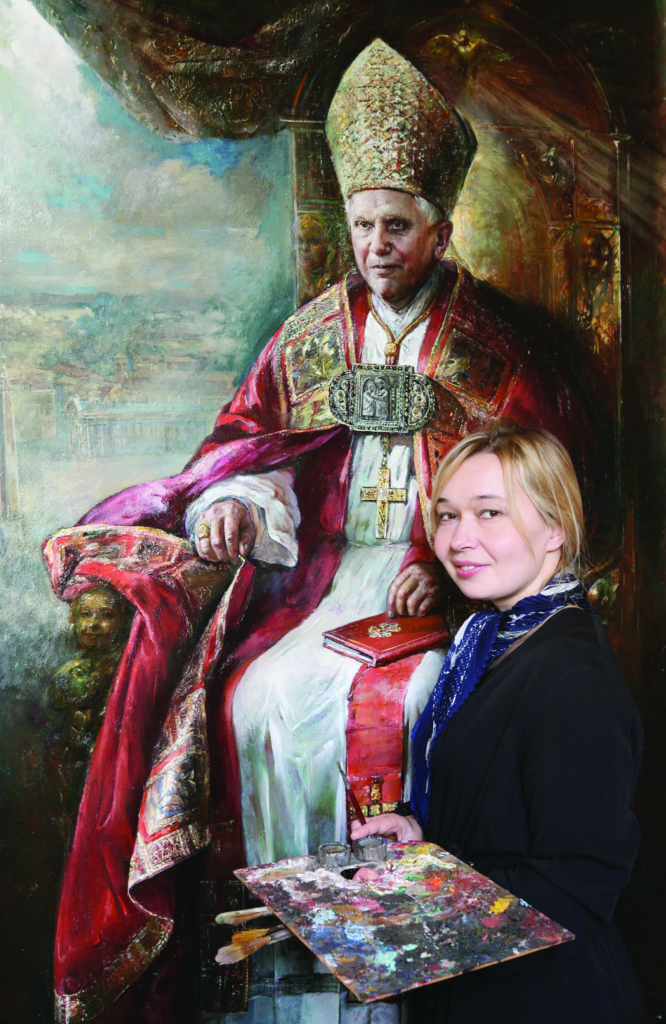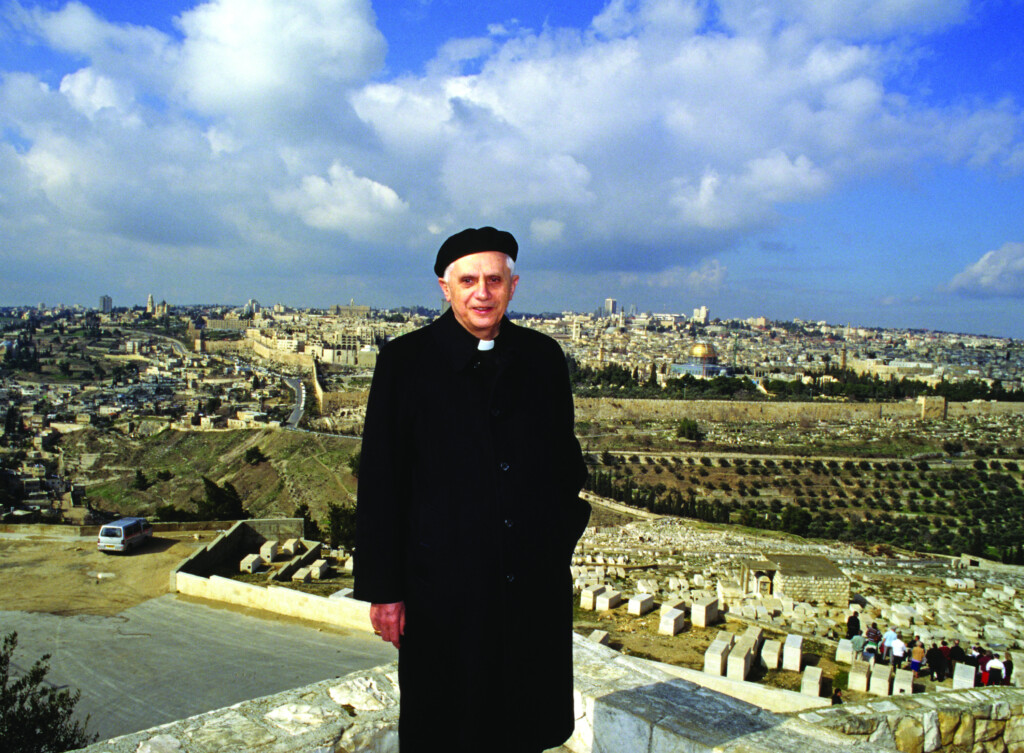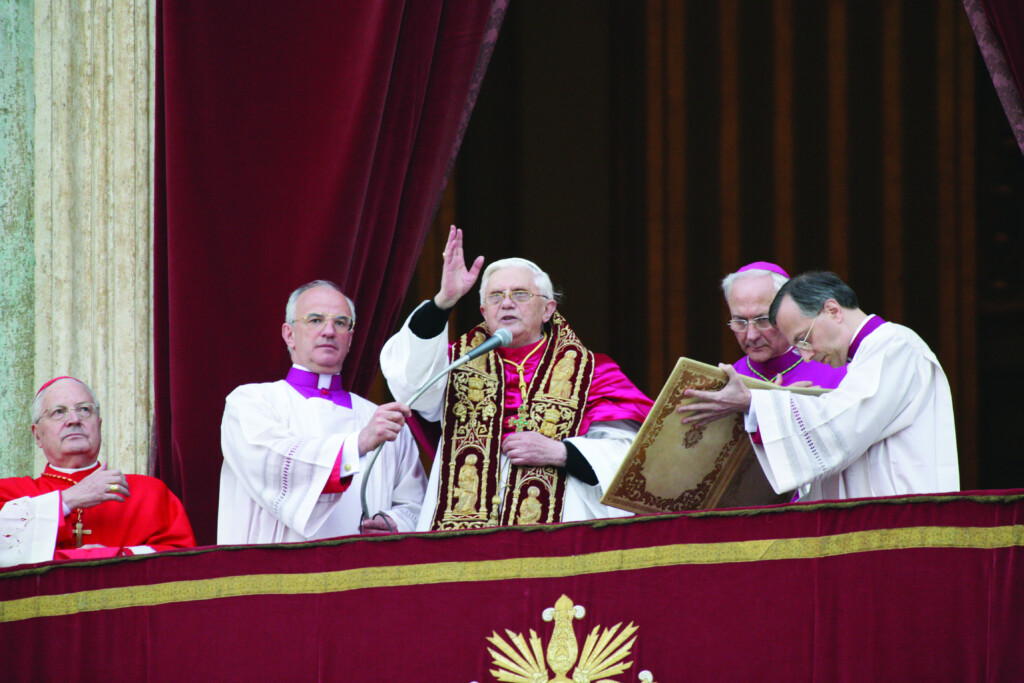By Robert Moynihan
Pope Emeritus Benedict XVI passed away on December 31, 2022, at the age of 95, at the Mater Ecclesiae convent in the Vatican, where he spent the last years of his long life in retreat and prayer.
I was privileged to be a friend of this holy and humble man, whose intellectual patrimony and testimony of life will enrich the Church for decades and centuries to come.
I first met him in September 1984, in St. Peter’s Square, almost 40 years ago now. I was just 30, he in his late 50s. I was walking just before 9 a.m. under a sunny Italian sky toward the Vatican Library when I saw a white-haired man with a dark leather briefcase walking across my path. I recognized him from seeing him on Italian television.
“Excuse me,” I said. “Are you Cardinal Ratzinger?”
“I am,” he said.
“I am doing some research here in the Vatican Library for a thesis I am writing, and I have been reading your book, The Theology of History in St. Bonaventure, and appreciating it very much,” I said.
“Well, thank you,” he replied, smiling. “You know, you are the only one in Rome who has read that book of mine.” (He meant that his other books, like Introduction to Christianity, and his writings on the Second Vatican Council, were the works most people read.)
As you see, I never forgot those words: “The only one in Rome.” They made me feel my academic research had brought me to a special place, to study matters few others were studying, yet matters of importance to this cardinal who would, 20 years later, be elected Pope.
“Coworkers of the Truth”
Thus began a friendship that was to continue for 40 years. I consulted him on the research I was doing, and interviewed him many times, especially in the 1990s, discussing with him the dangers facing the Church and the faith in these modern times. I did not know then that I would create and publish my own magazine on the Vatican, and put him on the cover of 15 issues over 30 years, and write a book about him, trying to support him and help him as he led our Catholic Church as cardinal, as Pope, and as Pope Emeritus.
He chose the motto Cooperatores veritatis (“Coworkers of the Truth”) for his episcopal coat of arms. I tried to become one of his “coworkers” in our age of relativism, an age that often denies that there is any “truth.” Pope Benedict’s wisdom and learning always led him back to the light of truth, not to strange doctrines and new teachings of his own creation. With patience and humility he accepted the great burdens of being the Prefect of the Congregation for the Doctrine of the Faith and then the Pope, gently attempting to correct the erring. As it says in Wisdom: “For you correct little by little those who trespass, and remind and warn them of the things wherein they sin, that they may be freed from wickedness….” (Wisdom 12:1-2).
And now he has passed away. His last words were, “Signore, ti amo” (“Lord, I love you”).

December 6, 2007 — Rome. Russian painter Natalia Tsarkova poses next to her painting of Pope Benedict XVI (Photo Grzegorz Galazka)

February 1994 — Israel. Cardinal Joseph Ratzinger visits Jerusalem on the occasion of the interreligious symposium between exponents of Judaism and the various Christian communities (Photo Grzegorz Galazka)
“The dictatorship of relativism”
Shortly before he entered the 2005 conclave in which he was elected Pope, then-Cardinal Ratzinger preached the homily at the pre-conclave Mass. In that homily, he warned against the rise of “a dictatorship of relativism.” Taking as his text St. Paul’s warning to the Ephesians (4:14-16), that “we must no longer be children, tossed to and fro and carried about by every wind of doctrine” but “must grow up” in Christ and in love, the cardinal offered the following reflection: “Every day new sects are born and we see realized what St. Paul says on the deception of men, on the cunning that tends to lead into error (cf. Ephesians 4:14). To have a clear faith according to the creed of the Church, is often labeled as fundamentalism, while relativism, that is, allowing oneself to be carried about with every wind of ‘doctrine,’ seems to be the only attitude that is fashionable. A dictatorship of relativism is being constituted that recognizes nothing as absolute and which only leaves the ‘I’ and its whims as the ultimate measure.”
Someone with his foresight and intellectual gifts surely suffered enormously at seeing these ominous storm clouds rolling in above humanity. And the clouds seem darker today than 20 years ago…
Yet, he never succumbed to despair but continued to exhort us to hope — to Christian hope — which was the subject of his second encyclical, published on November 30, 2007, Spe salvi (“By hope saved”). In that encyclical, he wrote: “Hope is practiced through the virtue of patience, which continues to do good even in the face of apparent failure, and through the virtue of humility, which accepts God’s mystery and trusts him even at times of darkness.
“Faith… gives us the victorious certainty that it is really true: God is love! It thus transforms our impatience and our doubts into the sure hope that God holds the world in his hands and that, as the dramatic imagery of the end of the Book of Revelation points out, in spite of all darkness, he ultimately triumphs in glory.
“Love is the light — and in the end, the only light — that can always illuminate a world grown dim and give us the courage needed to keep living and working.”
Ratzinger’s ecclesial service expanded during the course of eight decades, from his native Bavaria to the ends of the earth, as his gaze focused on the fascinating and mysterious face of Jesus, until the moment of the Encounter. The legacy he leaves us is of a theologian called to the See of Peter, who confirmed his brethren in the faith through teaching, sacramental service and witness of life.

Vatican City, April 19, 2005. Joseph Ratzinger’s first blessing as Pope to the faithful who flocked to St. Peter’s Square to meet him (Photo Grzegorz Galazka)






Facebook Comments